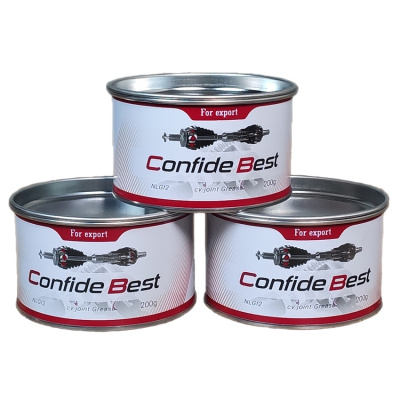CV joint grease
Grease is a popular slimy lubricant, especially whenever oil can’t be used (like on the ball bearings for the wheels). The semi-solid nature of grease helps it stick to one place and not to flow out of the parts.
Grease is usually used when at least one of these conditions is met:
- The lube doesn’t need to tolerate a high temperature. Grease’s working temperature is usually below 100 °C as it can’t tolerate high temperatures.
- It’s a fairly easy part to lubricate and grease is more than enough for lubricating it.
- It’s not possible to lubricate the part using oil or other common lubrication methods.
- The part that is being lubricated must be kept clean from dirt or moisture.
One of the use cases of grease is in places where we don’t want any dust or moisture to settle on the parts.
Parts that are greased usually get covered by plastic or rubber caps to prevent dust build-up. Grease is a sticky substance which means it will attract all manner of small particles (which isn’t bad on its own since it prevents the particles from attaching to the greased parts themselves), so if a greased part was to not have a rubber cap it would get very dirty over time by absorbing dust or any other particles.
So, if grease is used together with the cap for proper sealing, it would not only act as a lubricant but also prevent any dirt from entering the greased mechanisms. But without the cap and proper sealing, it will attract more dirt and probably not do a good job of lubricating the parts either. All of this means the caps can get dirty which lowers their life span.
Tips on choosing the right grease:
When choosing a grease you have to pay attention to the type of grease you need, the humidity level of the environment it’s going to be used in, and the operational temperature of that part of the car that is being greased. The range of temperature change must also be considered.
The grease you choose must be able to protect the car parts from corrosion, wear and tear, and rust. It must be compatible with plastic or rubber parts (no chemical reactions). The grease’s service life and reusability must also be taken into account.
Greases in the market
One of the problems with factory greases in the market is that they melt away in high temperatures.
Features of Confide Best grease
- High service life
- Highly water repellent
- High resistance to cold (down to -20 °C)
- Very high protection against corrosion and wear
- Good oxidation stability
- High dropping point (300 °C)
Grease gets damaged over time. A grease with a melting point of 90 °C would vaporize, leave sediments on the CV joints and burn, which damages the joints. Due to their high melting points, Confide Best greases don’t dry and burn, which helps decrease corrosion in the CV joints.
Sadly, some mechanics use a mixture of grease and Valvoline oil for the rubber caps on CV joints (something that mechanics have been doing on the differential gear in the past 40 years) but the molecular structure of grease and oil is different, and mixing them creates a new molecular structure that has the characteristics of neither of them.
Mechanics originally used the oil and grease mixture for the gearbox in older cars but using the same mixture for CV joints is wrong. Liquid oil must be used on the differential gears but the rubber cap on CV joints needs a specific type of grease that doesn’t freeze under cold or evaporate under heat and leave sediments.
About Confide Best Co. and its services
Confide Best Co. has been making CV joint caps and grease for years and we can deliver these products to our dear customers in any part of Iran in the shortest time possible.
You can visit our online store on the website to choose and order the product you need at a reasonable price and very high quality.
If you have any questions or need a consultation please contact our support to get in touch with our advisors.

